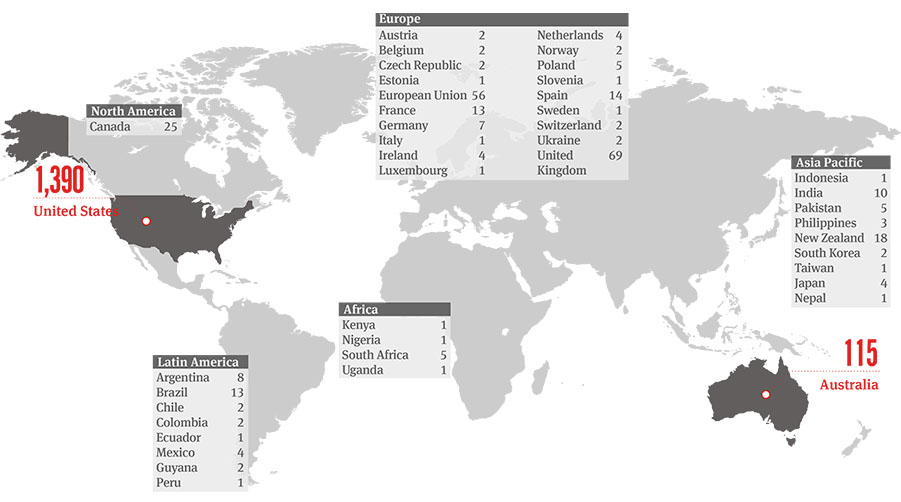Introduction
Since our last update, progress on addressing climate change has been mixed as the world continues to grapple with responding to the devastating COVID-19 pandemic. However, the momentum of increasing climate litigation has continued into 2021, and a number of landmark decisions have been handed down since our last update.
As at July 2021, the total number of climate change cases filed to date has reached over 1,800,1 up from about 1,650 as at November 2020. Cases continue to be commenced in many jurisdictions in both court and non-court forums.

We expect that, given recent successful decisions grounded in human rights, further actions will be commenced against both governments and corporates based on similar causes of action. The fossil fuel sector remains the main target of legal action, but it is conceivable that over time the nature of defendants may become more diverse, particularly if other high-emitting sectors are not seen to be taking substantive action to reduce emissions or move towards net zero.
We also predict a significant risk of “greenwashing” claims being commenced as companies and other organisations face greater scrutiny of the actions they are taking in order to meet publicly announced targets.
This legal update considers key developments and cases since December 2020.
The cases are divided into the following categories:
- Human rights and constitutional claims
- Legal action taken against governments
- Private law
- Planning and permitting
- Administrative law and torts
Human rights
Neubauer, et al. v Germany
In February 2020, 9 German youths filed a constitutional complaint with the Federal Constitutional Court of Germany. The plaintiffs’ complaint alleged that the greenhouse gas (GHG) emissions reduction target in the German Federal Climate Protection Act, which is 55% by 2030 from 1990 levels, is insufficient to meet Germany’s obligations under the Paris Agreement. It was further alleged that the insufficient target violates the plaintiffs’ human rights to human dignity, life and physical integrity, as protected by Articles 1 and 2 of the German Constitution (Basic Law), in each case in conjunction with Article 20a of the Basic Law, which provides that Germany must protect the natural foundations of life whilst being mindful of its responsibility towards future generations.
The plaintiffs sought a declaration that the Federal Climate Protection Act violated the Basic Law, and that the German government must amend the Act and issue a more ambitious GHG emissions reduction target.
In April 2021, the Court held largely in favour of the plaintiffs. The Court held that Article 20a of the Basic Law should be read to include the obligation to protect life and health from the dangers of climate change. The Court held that this constitutional obligation “does not however take absolute precedence over other interests. In cases of conflict, it must be balanced against other constitutional interests and principle”2.
The Court referred to this as a balancing process, and found that “Within the balancing process, the obligation to take climate action is accorded increasing weight as climate change intensifies.”3 With this noted, the Court declared that parts of the Federal Climate Protection Act were inconsistent with Article 20a of the Basic Law, and ordered that the government amend the Federal Climate Protection Act with updated reduction targets by 31 December 2022.
Six Youths v Minister of Environment and Others
In April 2021, 6 young climate activists filed a popular action in the Brazilian Federal Civil Court, alleging that the government of Brazil has violated its obligations under the Paris Agreement and domestic laws. This follows Brazil submitting its updated Nationally Determined Contribution (NDC). The NDC has maintained a goal to cut emissions by 43% by 2030, but has raised the estimated baseline emissions level for that goal to be emissions level from 2005. It is alleged that in effect, this change of baseline emissions would increase Brazil’s emissions by 400 million tonnes by 2030, compared to what was initially proposed in the 2015 version of the country’s NDC.
The case effectively alleges Brazil has attempted a carbon accounting manoeuvre. The plaintiffs assert that under the Paris Agreement there is an obligation to increase ambition in updated NDC’s and that the new NDC violates this obligation. The plaintiffs have further argued that the new NDC violates Brazil's National Policy on Climate Change as well as the obligation to safeguard the fundamental right to an ecologically balanced environment for present and future generations under article 225 of Brazil’s Constitution. A court date is yet to be set.
Plan B Earth and Others v Prime Minister
On 1 May 2021, Plan B Earth and three young people filed an application for judicial review, alleging that the United Kingdom (UK) government has violated their human rights to life, to family life and to be free from discrimination in the enjoyment of such rights, which are protected under Articles 2, 8 and 14 of the European Convention of Human Rights (ECHR) and which have been implemented into UK domestic law. The Claimants have alleged that the government’s actions disregard the terms of the Paris Agreement. The government’s actions mentioned in the claim include supporting the opening of a new coal mine, financing overseas fossil fuel projects, and reducing financial support for international communities already exposed to severe climate risks and impacts.
In the application for judicial review the Claimants are seeking:
- a declaration that the Defendants’ failure to take practical and effective measures to meet their climate change commitments arising under law breaches the Claimants' human rights; and
- an order that the Defendants implement, with appropriate urgency, a legal and regulatory framework sufficient to meet their climate change commitments.
VZW Klimaatzaak v Kingdom of Belgium & Others
In June 2021 the Brussels Court of First Instance handed down its judgement in a case with similarities to the landmark case Urgenda v Netherlands. VZW Klimaatzaak, a Belgian non-profit organization and almost 58,000 Belgian citizens, had filed an action against the Belgium State and three regions of Belgium alleging that failure to take sufficient action in reducing GHG emissions, constitutes a breach of the Belgian Civil Code, the ECHR, and the Convention on the Rights of the Child.
The plaintiffs sought a declaratory order confirming such breaches, and an order that the defendants take the necessary steps to reduce Belgium’s emissions to:
- at least 42% below 1990 levels by 2025;
- at least 55% below 1990 levels by 2030; and
- achieve net zero by 2050.
Klimaatzaak also sought a penalty payment of EUR 1,000,000 per month of delay in reaching the target imposed for 2025 and the target imposed for 2030, starting on the first of January of the year following the deadline.
In its decision on the merits, the Court held that the defendants’ failure to take action to reduce emissions constitutes a breach of both their duty to act with prudence and diligence within the meaning of Article 1382 of the Civil Code and their obligations under Articles 2 and 8 of the ECHR for which they are jointly and severally liable. The Court, however, declined to grant the order mandating reduction targets, holding that this would infringe the principle of separation of powers.
Nonetheless, the case represents another landmark decision in that it continues to develop the continental European line of authorities on the scope of the ECHR (and other treaties) to address climate related issues.
Union of Swiss Senior Women for Climate Protection v Swiss Federal Council and Others, Application no. 53600/20
On 26 November 2020, the Union of Swiss Senior Women for Climate Protection filed a petition in the European Court of Human Rights (ECtHR) against the government of Switzerland, which was accepted by the Court. The Court has accorded the complaint priority status.
The application was filed before the ECtHR after the complaint had been dismissed by the Swiss courts in multiple proceedings. The application lists three main complaints:
- that Switzerland has inadequate climate policies, which violate women’s right to life and health under Articles 2 and 8 of the ECHR. In particular, senior women are especially vulnerable to the heat waves expected to result from climate change;
- the Swiss Federal Supreme Court rejected the case on arbitrary grounds, in violation of the right to a fair trial under Article 6; and
- the Swiss authorities and courts did not deal with the content of their complaint, in violation of the right to an effective remedy in Article 13.
The ECtHR is ultimately being asked to determine whether a state is capable of violating human rights through inadequate climate protection.
Greenpeace Nordic Ass’n and Nature and Youth v Ministry of Petroleum and Energy
In November 2016, Greenpeace Nordic Association and environmental group Nature and Youth filed a lawsuit in the Oslo District Court against the government of Norway, alleging that the government had violated article 112 of the Norwegian Constitution by deciding to grant deep-sea petroleum extraction licences. Article 112 of the Constitution provides that “every person has the right to an environment that is conducive to health and to natural surroundings whose productivity and diversity are preserved”.4 It was alleged that Article 112 grants the Court jurisdiction to declare the grant of deep-sea licences invalid because the decision violated the rights the article is intended to protect. The plaintiffs sought orders to that effect.
In January 2018, the Court ruled in favour of the government. The plaintiffs appealed the decision to the Bogarting Court of Appeal, alleging that the District Court erred in its interpretation of article 112. In January 2020, the Borgarting Court of Appeal affirmed the District Court's decision. The plaintiffs appealed that second decision in February 2020.
In December 2020, the Supreme Court of Norway found in favour of the government. The Supreme Court acknowledged that article 112 of the Constitution protects individuals from climate change-related risks, but upheld the deep-sea petroleum extraction licenses and found that Norway had not violated article 112 of the Constitution. The Court explained that the uncertainties surrounding future emissions from exported oil rendered it insufficient to prevent the granting of the licenses.
Having failed before the domestic courts, in June 2021, a group of Norwegian climate activists, Greenpeace and Young Friends of the Earth applied for the case to be heard before the ECtHR. The application alleges that Norway’s plans for additional oil exploration and drilling in the Arctic deprives young people of their fundamental human rights.
Legal actions taken against governments
Notre Affaire à Tous and others v France
On 17 December 2018, Notre Affaire à Tous, Fondation pour la Nature et l’Homme, Greenpeace France, and Oxfam France sent a formal notice to the French Government, alleging that its failure to implement proper measures to effectively address climate change violated a statutory duty to act.
The government rejected their claim. On 14 March 2019 the nonprofit organisations initiated a lawsuit before the Paris Administrative Court. The plaintiffs requested that the Court order the government to pay compensation for harm caused and to take measures to address climate change.
On 3 February 2021, the Paris Administrative Court handed down its decision. The Court recognised that the government has caused ecological damage; however the government was not ordered to pay compensation, as the Court found that the plaintiffs had failed to prove that the government could not repair the harm caused by the ecological damage.
The Court also recognised the existence of moral damage, and ordered that the government pay compensation to each plaintiff for harm caused by that damage. The Court also ordered that, before making orders regarding the measures to be taken by the government to address climate change, further information must be provided to the Court, within 2 months of the parties being notified of judgement, about how the government plans to meet its climate change targets.
Saskatchewan et al. v Canada re Greenhouse Gas Pollution Pricing Act
In March 2021, the Supreme Court of Canada heard three appeals related to challenges brought by the provinces Alberta, Saskatchewan and Ontario that alleged that the federal government’s carbon pricing backstop was unconstitutional, with the Court ultimately upholding the regime as constitutional.
The Canadian federal regime establishes a national minimum price for GHG emissions ($40 CAD per tonne of CO2-e in 2021, rising to $170 in 2030), as well as industry-specific GHG emissions reduction targets. The provinces argued that these standards exceeded federal jurisdiction because they encroached on the provinces’ exclusive constitutional power to regulate property and civil rights. The federal government sought to uphold the law as being captured by its “peace, order and good government” power as a matter of “national concern”. This allows it to govern matters of sufficient concern to the entire country that pass the “single, distinct and indivisible” test.
In a 6-3 decision, the majority found that the threat posed by climate change coupled with the risk of “carbon leakage” as between the provinces was of sufficient national concern to fall within the federal government’s power. Three separate dissents were issued, each raising concerns that the majority permitted the federal government to veer too deeply into matters of industrial policy, which was in the sole purview of the provinces. For market participants, however, this decision provides carbon pricing certainty for the foreseeable future.
Private law
Milieudefensie et al. v Royal Dutch Shell plc
On 26 May 2021, the District Court of The Hague handed down a ground-breaking judgement in collective action proceedings initiated by several non-governmental organizations (including Friends of the Earth (Milieudefensie)) (the NGOs) against Royal Dutch Shell plc (Shell). The NGOs claimed that Shell had to reduce its overall CO2 emissions by at least 45% from 2019 levels, by the end of 2030 (the Target Reduction).
The Court ruled in favour of the NGOs and ordered Shell to reach the Target Reduction. This is the first time that a court has ordered a company to reduce its CO2 emissions in line with the climate goals included in the Paris Agreement.
The Court’s decision is based on the Dutch general tort provision (section 6:162 of the Dutch Civil Code). In its assessment as to whether Shell acted contrary to the unwritten duty of care within the meaning of this provision, the Court referred to international soft law frameworks such as the UN Guiding Principles and took into account all circumstances of the case and more specifically:
- consequences of Shell’s CO2 emissions;
- Shell’s influence over CO2 emissions; and
- human rights law.
In view of these, the Court noted that Shell will act contrary to its unwritten duty of care if it does not reach the Target Reduction and therefore ordered Shell to reach the target. In this regard, the Court ruled that Shell has:
- an “obligation of result” for the activities of the Shell group – this means that Shell must ensure that its group companies reach the Target Reduction; and
- a “significant best-efforts obligation” with respect to business partners of the Shell group, including end users – this entails taking necessary steps to remove or prevent the serious risk resultingfrom CO2 emissions generated by Shell’s business partners, and using its influence to limit any lasting consequences of such emissions as much as possible.
A more detailed summary of the decision can be found here.
In a press statement by Shell dated 20 July 2021 it was announced that Shell will appeal the Court’s decision. Shell has until 26 August 2021 to lodge an appeal.
Planning and permitting
R (on the application of ClientEarth) v Secretary of State for Business, Energy and Industrial Strategy
Since the December 2020 update, the Court of Appeal has dismissed the appeal by ClientEarth in respect of the Secretary of State’s decision to grant a development consent order to Drax Power Limited for the construction and operation of two gas-fired generating units at the Drax Power Station in North Yorkshire. ClientEarth brought the appeal on three grounds, arguing that the Secretary of State had:
- misinterpreted the Overarching National Policy Statement for Energy (EN-1) on the approach to assessing a nationally significant energy infrastructure project’s contribution to satisfying the need for the type of infrastructure proposed;
- misinterpreted EN-1 on the approach to GHG emissions; and/or
- misapplied Section 104(7) of the Planning Act 2008.
ClientEarth argued that a quantitative assessment was required to calculate a project’s particular contribution to satisfying the need for new energy infrastructure. The Court of Appeal disagreed, finding instead that the decision maker should give substantial weight to considerations of ‘need’ and that this should be proportionate to the project’s anticipated contribution to meeting the need. A detailed summary of the decision can be found here.
R (on the application of Friends of the Earth Ltd) v Heathrow Airport Ltd UKSC; R (on the application of Friends of the Earth Ltd and others) v Arora Holdings Ltd
Since the December 2020 update, the Supreme Court has overturned the Court of Appeal decision that the UK government had acted unlawfully by approving the expansion of Heathrow International Airport, without considering the country’s commitment to meeting the Paris Agreement goals. The Court agreed with four grounds of Heathrow Airport Limited’s appeal:
- the Paris Agreement does not constitute the government policy under the Planning Act 2008;
- the Secretary of State did not fail to act with the objective of sustainable development by failing to consider the Paris Agreement;
- the Secretary did not treat the Paris Agreement as legally irrelevant to their Strategic Environmental Assessment; and
- the Secretary did not act irrationally in excluding post-2050 and non-CO2 emissions.
The government is now able to seek a development consent order as is required for nationally significant infrastructure projects.
R (Sarah Finch) v Surrey County Council
In December 2020, the High Court (England & Wales) dismissed Sarah Finch’s challenge of Surrey County Council’s (SCC) decision to grant Horse Hill Developments Ltd planning permission to expand its oil drilling and production site in Surrey, England.
Ms Finch contended that the SCC had breached its obligations under Directive 2011/92/EU (as amended, the EIA Directive) and the Town and Country Planning (Environmental Impact Assessment) Regulations 2017 (2017 Regulations) by having failed to assess the indirect GHG emissions impact of the proposed development for which planning permission had been sought. The Court held that the SCC had not breached its obligations because there was a distinction to be drawn between the environmental impact of a development itself and that of an end product, the latter not needing to be considered under an environmental impact assessment.
In her second submission, Ms Finch argued that the SCC had failed to comply with its obligations under the EIA Directive and the 2017 Regulations and/or erred in law by interpreting paragraph 183 of the National Planning Policy Framework and paragraphs 12 and 112 of the Minerals Planning Practice Guidance as allowing the exclusion of downstream GHG emissions from its impact assessment. In the alternative, Ms Finch argued that if the SCC had not misinterpreted these policies, then they were unlawful in so far as they allowed planning permission to be granted in contravention of the EIA Directive and the 2017 Regulations. Both these grounds were rejected.
In March 2021, the Court of Appeal granted Ms Finch’s application to appeal the High Court’s decision.
Sharma v Minister for the Environment
Since the December 2020 update, the Federal Court of Australia has handed down an extremely significant decision, where the Court found that the Minister for the Environment (Minister) owed the applicants a duty of care to take reasonable care to avoid causing personal injury to Australian children through climate impacts when deciding whether to approve the Vickery Project.
On 27 May 2021 the Court accepted that there was a real, significant and foreseeable risk of harm for Australian children arising from a continued increase in global surface temperatures, to which the Vickery expansion would contribute if it proceeded. Importantly, the Court held that, even though the specific contribution to increased global emissions from approval of the Vickery Project itself “may fairly be described as tiny”5, that contribution was not “so insignificant’ as to deny a real and foreseeable risk of harm to the children.
Nevertheless, the Court declined to grant an injunction to restrain the Minister from an ‘apprehended breach’ of the duty of care on the basis that it was “not satisfied that a more nuanced response from the Minister, something short of unconditional approval, is necessarily unavailable as a reasonable response to the foreseeable harm to the Australian children”.6
On 8 July 2021 the Court declared that the Minister has a duty of care to avoid causing personal injury or death to Australian children arising from CO2 emissions into the atmosphere, when deciding whether to approve the Vickery Project.7
The decision in Sharma fundamentally alters the liability landscape in the context of climate change. Potentially, the recognition of the duty, if supported by other courts, could operate to condition the ability not only of governments but also of private entities to undertake new developments and projects. It could also conceivably affect any business activity that may lead to an appreciable risk of harm arising from the contribution of that activity to net carbon emissions. A more detailed summary of the decision can be found here.
On 16 July 2021 the Minister lodged an appeal against the decision.
Thomas v EPA
In May 2020, a Guyanese scientist filed judicial review proceedings in the High Court of the Supreme Court of Judicature of Guyana against the Environmental Protection Agency (EPA) of Guyana. The applicant claimed that the EPA had acted beyond its power and without legal authority in granting permits to Esso Exploration and Production Guyana Ltd (Esso Exploration) for oil exploration for periods exceeding 23 years. The regulations under the Environmental Protection Act provided that a permit could be granted for no more than five years.
The applicant sought court orders to quash the decision of the EPA to grant the permits to Esso Exploration, and to direct the EPA to issue corrected permits that are effective until a fixed date that is not beyond 5 years from the date on which the permit is granted.
In the applicant’s affidavit, they made a number of statements relating to the impact of climate change. It was stated that breaching the regulations under the Environmental Protection Act exposes “Guyana and the rest of the world to serious, if not irreparable, harm and adverse consequences from climate change."8
In October 2020, the Supreme Court of Guyana issued a consent order regarding an agreement that was reached between the parties. The terms of the settlement required the EPA to reduce the terms of the permits to 5 years, and to file amended permits demonstrating compliance with that order.
West Cumbria Mining v Cumbria County Council
On 5 March 2021, West Cumbria Mining Ltd filed an application for judicial review of Cumbria County Council's decision to reconsider a planning application for a new coal mine in West Cumbria in the UK for the fourth time. The planning application for the development was first submitted to the Cumbria County Council in May 2017. The planning application has gained significant attention from members of the local community, many of whom argue that the opening of a new coal mine undermines the UK’s commitment to cut its carbon emissions by 2035.
On 11 March 2021 the Secretary of State used its powers to “call in” the application, meaning that the application will be referred to the Secretary of State to decide at the national level, rather than being referred back to Cumbria County Council for a fourth time. The Secretary of State considers that the matter should be explored during a public inquiry. Importantly, in its official statement the Secretary of State commented that “this application raises planning issues of more than local importance”.9
Administrative law and torts
Ministério Público Federal v de Rezende
In 2018, Brazil’s federal prosecution office, the Ministério Público Federal (MPF), established the Amazon Task Force to combat illegal deforestation in the Amazon region. The MPF brought a tort action in April 2021 against Dauro Parreiras de Rezende, a Brazilian cattle farmer, for causing deforestation in the Amazon between the years 2011 and 2018.
The MPF alleges that, as a result of the deforestation, the constitutional right to a healthy environment has been violated. The 7th Federal Environmental and Agrarian Court issued a preliminary decision on 16 April 2021 that granted an injunction against de Rezende and suspended paperwork pertaining to the movement of cattle in relation to de Rezende’s farms.
In addition to the constitutional argument, the MPF’s petition sought up to US$17 million in damages, conferring responsibility on de Rezende’s cattle ranching for deforestation in the Amazon. This aspect of the case is rare amongst constitution-based climate change litigation as the significant damages amount is meant to represent broad climate and environmental damage resulting from the deforestation.
Friends of the Earth Limited v Secretary of State for International Trade & President of the Board of Trade and HM Treasury
The background to this matter was summarised in our December 2020 update. In April 2021, the High Court of Justice granted Friends of the Earth permission to challenge the UK Government’s decision to provide USD 1 billion in financial support for the development of an LNG project with Total in Mozambique.
Friends of the Earth was granted permission to proceed to a full judicial review on the basis of grounds 1 and 2, which are:
- the decision incorrectly found that the project was consistent with the UK’s and/or Mozambique’s Paris Agreement commitments; and
- the defendants failed to properly analyse whether supporting the project was consistent with the UK’s and Mozambique’s Paris Agreement obligations.
Okpabi v Royal Dutch Shell Plc
On 12 February 2021, the UK Supreme Court handed down its decision in Okpabi and others v Royal Dutch Shell Plc. The case concerned two sets of proceedings in negligence, brought by Nigerian citizens, against Royal Dutch Shell (based in the UK) and its Nigerian operating subsidiary which operated the oil pipeline. The claimants allege that they suffered harm as a result of the allegedly negligent operation of the oil pipeline and that Shell owed them a duty of care by virtue of its alleged control over its subsidiary.
Both the High Court and the Court of Appeal decided in favour of the defendants on the basis that the claimants had failed to present a properly arguable case that Royal Dutch Shell owed them a duty of care, but the Supreme Court unanimously allowed the matter to go to trial on merits. The Supreme Court considered (without making any findings) the circumstances in which a parent company may owe a duty of care to claimants who allege harm caused by its subsidiary.
This decision highlights that an English domiciled parent company may be liable in the English courts for claims brought by non-UK claimants, where it is arguable that the parent company may owe a duty of care towards the claimants for the acts of its subsidiary. It also shows that the bar for claimants to bring such a claim in the English courts is lower than previously thought. For more information, a detailed summary of the decision can be found here.
Conclusion
The majority of climate litigation continues to be initiated and pursued in the United States, however increasingly we are seeing actions being commenced in different jurisdictions and different forums. Action against governments, particularly what would be described as “strategic” cases, continue to gain both volume and prominence.
It can be expected that these strategic types of claim may start to increase against the private sector, particularly given recent significant successful decisions such as the Netherlands Shell decision and the Australian Sharma decision.
Human rights is likely to remain an active area for new litigation against both governments and corporations. Other trends are likely to encompass:
- damages claims for money required to be spent on adaptation measures;
- assessing whether financial risks and fiduciary duties have been adequately dealt with; and
- failure to disclose and manage climate change risks.10
We also expect the trend of cases which seek to restrict high emissions activities or developments to continue.
Please contact a member of our climate change team if you would like further information about any of the cases covered in this update, or would like to discuss climate change issues more generally.
The authors would like to acknowledge the contributions to this article by Elyssia Gasparotto, Elle McIntosh, Madeleine Barr, Sebastian Withers, Peter Cash, Alexandra Beasley, Rucha Sohani, Guido Bongers, Kevin Bushell, Daniel Corban, Ruth Cowly, Jan Duyvensz, Cara Dowling, Sarah Fitzpatrick, India Furse, Nimoy Kher, Kai Luck, Krista MacPherson, Michael Manhas, Caroline May, Maja Mazur, Rita Nader-Gurtoult, Stuart Neely, Emilija Rupsys, Holly Stebbing, Christine Yan and Chelsea Zwoerner.















